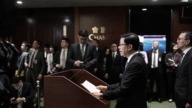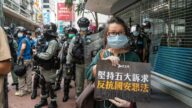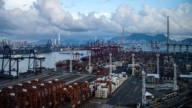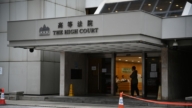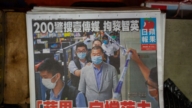【新唐人2011年8月6日訊】中宣部旗下的「中國記協」,8月1號在北京舉辦座談會,主題是,「從竊聽醜聞看西方新聞觀的虛偽本質」。不過,學者指出,西方新聞自由受到法律的保障和制約,而中國的媒體卻由某個部門掌握生殺大權。
《人民日報》8月2號大篇幅刊載了與會者的發言,座談會召集了在北京的新聞界、新聞研究機構,以及高校新聞院系約60多人參與。
會議上,《人民日報社》國際部主任呂岩松發言說,「我們所講的新聞自由,是一種被賦予「政治使命」的自由。」
《北京青年報社》社長張延平說,「我國媒體一定要認清媒體是「黨」的輿論陣地的特有屬性」。
《新華社》原副社長馬勝榮則表示,《世界新聞報》的竊聽醜聞正體現了西方一些媒體對「新聞自由」的濫用。
而中國藝術研究院學者吳祚來向《新唐人》表示,西方媒體是無冕之王,受到法律的保障,但是他們如果違反新聞道德,也將受到法律的制約。
吳祚來:「西方的媒體是有問題的,比如竊聽事件有很大問題,但關鍵是他們社會能夠通過一些方式,通過法律能夠糾正這樣一些錯誤。就是說,公權力,媒體的一些權利都是能夠得到糾正的。因為他們有獨立的法律來制約這些媒體的權利或公權力。」
但是中國的媒體卻完全受制於中宣部。而這個部門卻不受任何力量的制約和管理。
吳祚來:「他們想要封殺一個媒體,就可以封殺一個媒體,他們想控制一個人的言論,就可以控制一個人的言論。這是很大的一個問題。新聞界參加座談會的領導,他們很難回答這樣一個問題。他們上面想怎樣指示他,他們就得服從命令。但媒體應該是人民的聲音,應該公開公正。」
《法國國際廣播電臺》評論認為,在微博等新技術條件下,傳統的新聞禁令管制辦法受到衝擊,造成中宣部為首的輿論管制體系很強的緊迫感。一方面,許多新聞當事人在微博上即時發佈消息,使針對傳統媒體的管制難以奏效;而新聞從業者常將收到的管制禁令在微薄上發佈,或將被宣傳部禁止發佈的稿件在網路發佈,更使以新聞禁令為基礎的管制體系千瘡百孔。
在座談會召開之前的7月29號晚上,中共中央宣傳部接連向全國各大媒體發出幾條指令,要求對溫州動車事故的報導迅速降溫,原因是「海外輿情日趨複雜」,並要求除了引用權威機構的報導外,對動車事故一律不再報導和評論。迫使為動車事故做「頭七」悼念報導的各大媒體連夜撤版。在大陸五大門戶網站的新聞中心頁面上,動車事故消息從要聞欄目中集體消失。
香港的中國問題分析員李崇光通過《德國之聲》表示,中宣部既是一個意識形態部門,也是一個特殊利益部門。中共由於意識形態的利益而需要設立這一部門,因此這一部門也就成了一大批官僚的飯碗。中宣部作為政權的意識形態部門,其權力某種程度上已類似於前蘇聯的「克格勃」,只不過前者是在宣傳領域,後者則是在秘密警察領域而已。
新唐人記者秦雪、蕭宇採訪報導。
====
CCP Criticizes Western Press Freedom
China Journalists』 Association, which is the Chinese
Communist Party』s (CCP) propaganda department
held a symposium in Beijing on Aug. 1 with the theme
“Exposing the Western Press』s Hypocrisy,
Perspectives from the Tapping Scandal."
Scholars say that Western press freedom is protected and
sanctioned by law,
but the media in China are controlled by
the CCP』s propaganda department.
On Aug. 2, the CCP』s mouthpiece People』s Daily published
in a great length the remarks of the symposium participants.
Over 60 people from press research organizations and college
journalism departments attended the symposium.
Lü Yansong, director of People』s Daily international
department said, “The press freedom we refer to
is a kind of freedom of 『political mission』."
Zhang Yanping, president of the Beijing Youth Daily, said,
“Journalists in China must understand that the media
is a characteristic of the Party』s propaganda frontline."
Ma Shengrong, former vice president of Xinhua News Agency
said, News of the World tapping scandal embodied
the fact that some Western media abused “press freedom."
But, Wu Zuolai, a scholar of China Art Research Institute
told NTD that Western media is the uncrowned king.
It is protected by the law.
However, if they violate the press ethics,
they will also be punished by law.
Wu Zhuolai: “Problems do exist in Western media,
e.g., the problem of the tapping incident is very severe.
However, the Western society can correct such issues by law.
The rights enjoyed by the media can be rectified,
because there are independent legal systems
to restrict the abuse of the power of media."
However, the media in China is totally under the control of
the CCP』s propaganda department,
which is beyond any restriction or monitoring.
Wu Zhuolai: “They can block any media
and censor any public opinion at will.
This is a serious problem, which cannot be easily answered
by the media people attending the symposium.
They have to follow their superiors』 instructions.
However, the media is supposed to be a voice for the people
and should be open and impartial."
Radio France Internationale commented that
new communication technologies like micro-blog have
created a great challenge to the traditional media censorship,
putting a lot of pressure on the CCP』s media censorship system.
Many people release news by themselves on micro-blog,
rendering the traditional media censorship ineffective.
Also, some journalists often publicize the censorship order
on micro-blog or publish censored articles online,
making the CCP』s top-down press monitoring system
based on censorship orders more vulnerable to public scrutiny.
On July 29, before the symposium was held,
the propaganda department ordered all major Chinese media
to quickly cool down on the reports of Wenzhou train crash.
The reason was “the overseas media are getting complicated."
They request all media to not report on the train accident and
cite only the official press releases on the incident.
This ban forced the newspapers to take down the articles
commemorating the crash victims.
The news articles on the crash were removed from websites.
Li Chongguang, a China analyst in Hong Kong,
told Deutsche Welle that the CCP』s propaganda department
is not only a department of ideology,
but also a department of vested interests.
For its own ideological interests, the CCP set it up.
It has become a “rice bowl" of a large number of bureaucrats.
As an ideological department of the CCP, its power resembles
the spy agency KGB of the former USSR.
The difference is that the former is in the propaganda field,
while the latter was in the secret police area.
NTD reporters Qin Xue and Xiao Yu.


